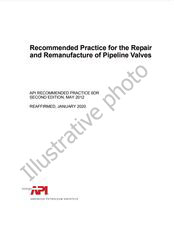We need your consent to use the individual data so that you can see information about your interests, among other things. Click "OK" to give your consent.

API RP 2FSIM-ed.1
Floating Systems Integrity Management
Translate name
STANDARD published on 1.9.2019
The information about the standard:
Designation standards: API RP 2FSIM-ed.1
Publication date standards: 1.9.2019
SKU: NS-1140089
The number of pages: 101
Approximate weight : 334 g (0.74 lbs)
Country: American technical standard
Category: Technical standards API
Annotation of standard text API RP 2FSIM-ed.1 :
API RP 2FSIM, 1st Edition, September 2019 - Floating Systems Integrity Management
This recommended practice (RP) provides guidance for floating system integrity management (FSIM) of floating production systems (FPSs), which include tension leg platforms (TLPs), used by the petroleum and natural gas industries to support drilling, production, storage, and/or offloading operations.
FPSs described in this RP are governed by local regulatory requirements and recognized classification society (RCS) rules (if classed). No specific regulatory compliance or RCS requirements are restated in this RP. The requirements of this RP do not apply to mobile offshore drilling units (MODUs) or to mobile offshore units (MOUs) used in support of construction operations. For integrity management (IM) considerations, these units are typically governed by RCS rules, and include, among others:
- — floating systems intended primarily to perform drilling and/or well intervention operations even when used for extended well test operations;
- — floating systems used for offshore construction operations (e.g. crane barges or pipelay barges), for temporary or permanent offshore living quarters, or for transport of equipment or products (e.g. transportation barges, cargo barges); for these, see appropriate RPs.
This RP does not address moorings or risers; these are addressed separately by API 2MIM and API 2RIM, respectively. Dynamic positioning is not covered in this RP.
The following types of floating systems are explicitly covered by this RP:
- — ship-shaped floating systems and barges (monohull or otherwise);
- — semisubmersibles;
- — spars;
- — tension leg platforms (TLPs), including tendon systems.
The following types of floating system components are included within the context of this RP:
- — hull structure, including above water, below water, and internal (i.e. hull compartments) structure and corrosion protection systems (e.g., coatings, cathodic potential, etc.);
- — structural systems, such as turrets, topsides structure, helidecks, flares, cranes, and process decks, and their interfaces with the hull structure;
- — mooring system support structure on the hull (e.g. foundations for chain jacks, fairleads, chain stoppers, etc.)
- — tendon systems, including foundations;
- — marine systems, such as ballast, bilge, venting, soundings, firefighting systems, cargo systems, emergency power, propulsion, steering, sensors, alarms, and controls (vessels in transit are not included);
- — permanent means of access and egress, including walkways, grating, handrails;
- — structural interfaces between hull structure and riser system;
- — appurtenances;
- — life safety appliances.
This RP is directly applicable to oil and gas producing floating systems operating at ambient temperature, including floating liquefied natural gas (FLNG) plants, except for the aspects related to handling and storage of cryogenic liquids.
The FSIM process provided in this RP is applicable to floating systems installed at any location worldwide. However, the referenced metocean criteria has regional limitations.
We recommend:
Technical standards updating
Do you want to make sure you use only the valid technical standards?
We can offer you a solution which will provide you a monthly overview concerning the updating of standards which you use.
Would you like to know more? Look at this page.



 Cookies
Cookies
